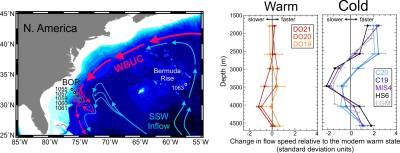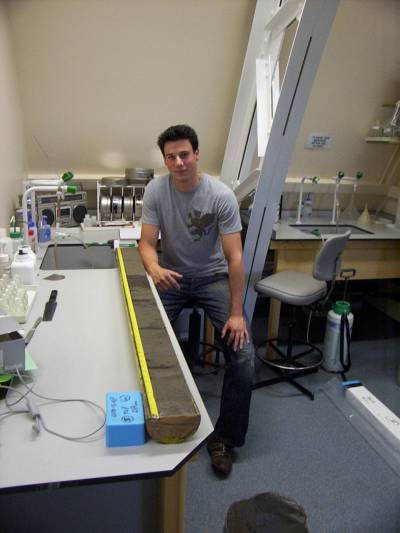I am an ocean and climate scientist, specializing in paleoceanography. The central focus of my research is investigating the ocean and its role in the climate system, to allow us to improve predictions of future climate change and take the necessary steps to protect our environment. I am interested in understanding the causes, mechanisms and impacts of climate change on decadal to millennial timescales. I use a range of sedimentary and geochemical proxies in marine sediment cores, with a particular emphasis on reconstructing recent changes in the circulation of the North Atlantic.
- More about Professor Thornalley
Employment
- Professor of Ocean and Climate Science, University College London (2021-present)
- Senior Lecturer/Associate Professor, University College London (2017-2021)
- Lecturer, University College London (2013-2017)
- Adjunct Scientist, Woods Hole Oceanographic Institution (2013-present)
- Postdoctoral Research Scholar, Woods Hole Oceanographic Institution (2011-2013)
- Postdoctoral Research Associate, Cardiff University (2008-2011)
Qualifications
- PhD, University of Cambridge (2008)
- MSci, MA, University of Cambridge (2004)
- Professional Certificate in Teaching and Learning in Higher and Professional Education, Inst. of Education, London (2015)
Professional Service
- Editor (topical), Climate of the Past
- Associate Editor, Paleoceanography and Paleoclimatology
- Member, International Evaluation Board for CHESS (Norwegian Research School on Changing Climates in the Coupled Earth System)
- Member, NERC BOSCORF Advisory Group
- Member, NERC National Environmental Isotope Facility Peer Review Panel A
- Deputy Director (Training and EDI lead) of the London NERC DTP
- Deputy Chair of Physical Geography MSc programmes
- Teaching
In 2015 I was awarded a UCL Student Choice Outstanding Teacher Award, and in 2019 and 2021 shortlisted for Outstanding Research Supervision.
I teach on the following modules:
Undergraduate
Postgraduate
- Publications
To view Professor Thornalley's publications, please visit UCL Profiles:
- Research Interests
During the late Quaternary, the Earth’s climate system has undergone climate oscillations on a range of timescales, from multi-decadal processes to glacial-interglacial cycles occurring every ~100,000 years. Changes in ocean circulation played a significant role in these climate events by altering the global redistribution of heat, dissolved nutrients and carbon. My research focuses on constraining how the circulation of the ocean changed in the past and the mechanisms by which these changes affected the global climate system and marine ecosystems.
I use a wide range of tools including: faunal assemblage, isotope and elemental ratio (e.g., Mg/Ca, B/Ca, Cd/Ca) analysis of foraminifera to reconstruct water mass properties; geochemical proxies of circulation such as measurement of Pa/Th ratios, Nd isotopes and radiocarbon concentrations; examination of the detrital components of sediment such as ice-rafted detritus and geochemical analysis of tephra for improving stratigraphy; sediment grain size analysis (e.g. sortable silt analysis) to reconstruct relative changes in paleo-current strength; and fluxes and composition of organic matter to the seafloor, combined with benthic faunal assemblage to investigate marine ecosystem changes.
Ongoing research projects
The response of the Deep Western Boundary Current to past abrupt climate change
Deep water produced in the high latitude North Atlantic forms a deep western boundary current that flows southward, at depth, along the eastern margin of North America. The DWBC plays an important role in rapidly transmitting climate signals into the ocean interior and helping ventilate the world’s oceans. I use grain size analysis to examine how the flow speed structure of the DWBC altered between warm and cold climate intervals in both glacial and interglacial periods (Figure 1). This work is also coupled to isotope ratios and element ratios in benthic foraminifera to determine changes in circulation patterns.
Figure 1. By measuring variations in the grain size of sediment in cores taken from the Northwest Atlantic, I am investigating how the flow speed structure of the Western Boundary Undercurrent (WBUC) altered under different climate states

Holocene and interglacial changes in the strength of the AMOC
The formation of cold, dense water in the North Atlantic plays a critical role in the global thermohaline circulation, and the compensating inflow of Atlantic surface waters helps warm NW Europe. Using grain size data from cores taken around the Atlantic, as well as reconstruction of surface ocean temperature in the subpolar region, I am investigating the strength of the Atlantic thermohaline circulation and its throughout the Holocene (0-11,700 years ago), examining likely controls and effects and its link with broader climate variability. With collaborators from WHOI, we collected new cores on cruises in May 2014 and Aug 2019. These cores are being used to examine changes in circulation over the past 2000 years, focussing on if there were exceptional changes during the Industrial era. This work formed part of an NSF project and our ongoing NERC ReconAMOC project, which also involves analysis of cutting-edge transient Holocene climate model simulation. Our new NERC project - VARING - will extend this work to look at climate and AMOC variability during previous interglacials, to find out if warmer climates are more unstable.
Deglacial changes in the circulation of the North Atlantic
The termination of the last Ice Age was accompanied by abrupt changes in ocean circulation. The North Atlantic and Nordic Seas in particularly were subject to dramatic reorganisations that are thought to have had an impact on global climate evolution through this period. Yet the mechanisms behind these changes remain uncertain. I use elemental ratios in benthic foraminifera to constrain changes in the physical and chemical properties of the North Atlantic and Nordic Seas. I am also using benthic radiocarbon dating to help constrain the ventilation of this oceanographic region since the last glacial.
Figure 2. A sediment core from south of Iceland. Ongoing work involves correlating volcanic ash layers (black layers) in the cores to similar ash layers found on land in Iceland and in Greenland ice cores to help develop age models and determine lead-lag relationships between different climate archives. Measuring the elemental ratios in foraminifera (microscopic, single-celled organisms), found within the core, can also be used to reconstruct the past physical and chemical properties of the ocean and determine its role during past climate change.

Subpolar gyre dynamics and ecosystem change during the Holocene
The strength of the North Atlantic’s subpolar gyre varies on annual to millennial timescales and it is likely involved in feedback mechanisms that impact atmospheric circulation and the overturning circulation of the ocean. I am investigating how the circulation of subpolar gyre changed on (multi-)decadal timescales throughout the last 2,000 years, as well as investigating millennial-scale changes throughout the Holocene. As part of the EU Atlas (Home - atlas - a transatlantic assessment and deep-water ecosystem-based spatial management plan for Europe) and iAtlantic (iAtlantic: Health Of Deep-Sea And Open-Ocean Ecosystems Research) projects my research group is investigating the potential impact of recent Atlantic circulation changes on deep-sea ecosystems and marine resources.
Further Resources
If you would like to learn about some of my recent work on the AMOC, please check out the resources below aimed at 14-19 year-olds:
YouTube Widget Placeholderhttps://www.youtube.com/watch?v=rQw59CCSu2A This article was produced by Futurum Careers, a free online resource and magazine aimed at encouraging 14-19-year-olds worldwide to pursue careers in science, tech, engineering, maths, medicine (STEM) and social sciences, humanities and the arts for people and the economy (SHAPE). For more information, teaching resources, and course and career guides, see Futurum.
- Impact
In 2016, I was awarded a Philip Leverhulme Prize in Geography, which "recognizes the achievement of outstanding researchers whose work has already attracted international recognition and whose future career is exceptionally promising".
My work focuses on understanding the role of the North Atlantic in abrupt climate change, and its impact on marine ecosystems. This work has revealed unexpected variability in the properties of both the surface and deep ocean, resulting in publications in Nature and Science, as well as wider public media attention, including coverage by The Guardian, Washington Post, TV coverage by Sky News, Channel 5 News and the BBC, and radio coverage by the BBC, NPR and others.
My work has been cited in numerous national and international climate summary documents, including the 4th US National Climate Assessment, the Future Earth and the Earth League climate science update for the Katowice climate summit 2018, the IPCC Special Report on the Ocean and Cryosphere in a Changing Climate, as well as the IPCC Sixth Assessment Report.
The research conducted by my group has contributed to a number of policy negotiations, highlighting the changes taking place in the North Atlantic. For example, the potential impact of a weakening AMOC on marine biodiversity was highlighted in the UK Government Sustainable Seas Inquiry (Environmental Audit Committee, 2019). Similarly, its potential to impact the resilience of deep-sea fauna to the impacts of deep-sea mining along the Mid-Atlantic Ridge was highlighted within an ATLAS submission to the International Seabed Authority, which provided comments on the draft Regulations on Exploitation of Mineral Resources in the Area (Boschen-Rose et al., 2018). The results of our work have been used to inform international policy, and have been presented at meetings including the Second session of the intergovernmental conference (IGC) to develop an international legally binding instrument on the conservation and sustainable use of marine biological diversity of areas beyond national jurisdiction (ILBI for BBNJ)(March 2019, New York City); First Global Planning Meetings for the UN Decade of Ocean Science for Sustainable Development (May 2019, Copenhagen); Food and Agriculture Organization (FAO) ABNJ Deep Sea Meeting (May 2019, Rome); International Seabed Authority (ISA) workshop on the regional environmental management plan (REMP) for the area of the northern Mid-Atlantic Ridge (November 2019, Évora). We have also written an invited policy brief for the Scottish Government: "Changing ocean state and its impact on natural capital".
The potential management impact of unusual circulation patterns has been highlighted by our recent research investigating variation in the North Atlantic subpolar gyre (Spooner et al., 2020, GRL). This work revealed that the changes in circulation experienced during the 20th century are unlike any conditions experienced in the past 10,000 years and align with northward migration of Atlantic mackerel, which were first observed in Icelandic waters in the late 1800s and have been observed in high abundance since the early 2000s. This study shows that the hydrographic changes experienced in the subpolar gyre during the industrial era (and largely during the 20th century) are not part of normal fluctuations and are instead part of a long-term trend that is likely contributing to shifts in fish stock distributions (Spooner et al. 2020). This long-term trend emphasises the need to consider climate change impacts in the management of ocean resources and the potential need to re-evaluate fisheries policies (e.g., total allowable catch and quota allocations) for species that have entered new legislative areas.
- Research Students
Current students
- Daniel Parkes: Investigating the cause and structure of abrupt climate change events in MIS 11 (Co-supervisor) - Joint UCL and Royal Holloway, University of London
- Eirini Papachristopoulou: Investigating the role of ocean circulation in circum-North Atlantic interglacial climate variability (Co-supervisor).
- Zarina Hewett: Examining the role of North Atlantic deep ocean circulation during Holocene abrupt climate events.
- Friso de Graaf, Impact of Northern Hemisphere Glaciation on Intermediate and Deep Ocean Circulation (Co-supervisor).
- Zhiyi Jiang, Analysis of interglacial AMOC and climate change in PMIP and transient modelling experiments (Co-supervisor).
- If you are interested in taking up a PhD place at UCL and working with me, please feel free to contact me about possible projects or check out the London NERC-DTP website.
- Past Students
- Jack Wharton, Thermal structure of the Northwest Atlantic during the late Quaternary Alice Carter-Champion, Investigating the drivers and responses of climatic complexity during the Younger Dryas (Co-supervisor).
- Paul Minton, Middle to late Miocene climate variability and biotic response: A high-resolution record from Integrated Ocean Drilling Program (IODP) (Co-supervisor).
- Rehemat Bhatia, Geochemical signals in greenhouse and icehouse planktonic foraminifera (Co-supervisor).
- Daniel Parkes, Investigating the cause and structure of abrupt climate change events in MIS 11 (Co-supervisor).
- Prizes, Awards and Grants
- 2022 - 2027 Explaining and Predicting the Ocean Conveyor (EPOC). (EU Horizon-RIA, €7,999,760 consortium. Thornalley - Co-I, Deputy WP leader and UCL lead; €547,077 for UCL)
- 2021 - 2025 Intra-interglacial variability: are warmer periods climatically more unstable? (VARING). (NERC. £784,021. PI: P.C. Tzedakis; Co-I: D. Thornalley; Res. Co-I: V. Margari)
- 2019 - 2023 Integrated Assessment of Atlantic Marine Ecosystems in Space and Time (iAtlantic). (EU Horizon 2020, €10,600,000 consortium. Thornalley - Co-I, €140,000 for UCL)
- 2019 - 2023 Beyond the instrumental record: Reconstructing Atlantic overturning over the past 7000 yrs (ReconAMOC). (NERC. £750,685. PI: D. Thornalley; Co-I: C. Brierley, S. Moreton; Res. Co-I: P. Spooner)
- 2016 - 2020: ATLAS: A Trans-AtLantic Assessment and deep-water ecosystem-based Spatial management plan for Europe. (9m euro consortium from EU Horizon 2020; Deputy work-package leader and Co-I; 204,000 euros for UCL)
- 2016 - 2019: Examining past abrupt climate change in the North Atlantic. (PI; Philip Leverhulme Prize. £100,000)
- 2012 - 2015: Holocene reconstructions of Iceland-Scotland Overflow and the Deep Western Boundary Current. (Co-PI; $545,000 from NSF; including co-chief on 8 day cruise south of Iceland)
- 2013 - 2015: North Atlantic deep water formation during the deglacial rise of atmospheric CO2. (PI; $22,500 from WHOI Institute of Ocean and Climate Change)
- 2011 - 2013: The role of North Atlantic circulation during past abrupt climate change. (PI; $90,000 from WHOI Institute of Ocean and Climate Change for Postdoctoral Research Scholarship)
- 2011 - 2012: A direct link between ocean circulation and abrupt climate change? (Researcher Co-I; £60,000 from UKIODP/NERC)
 Close
Close


